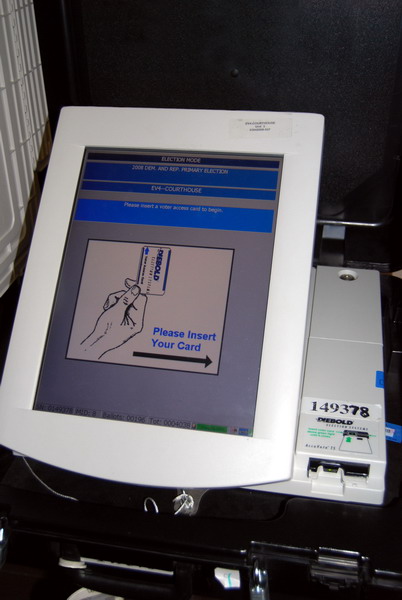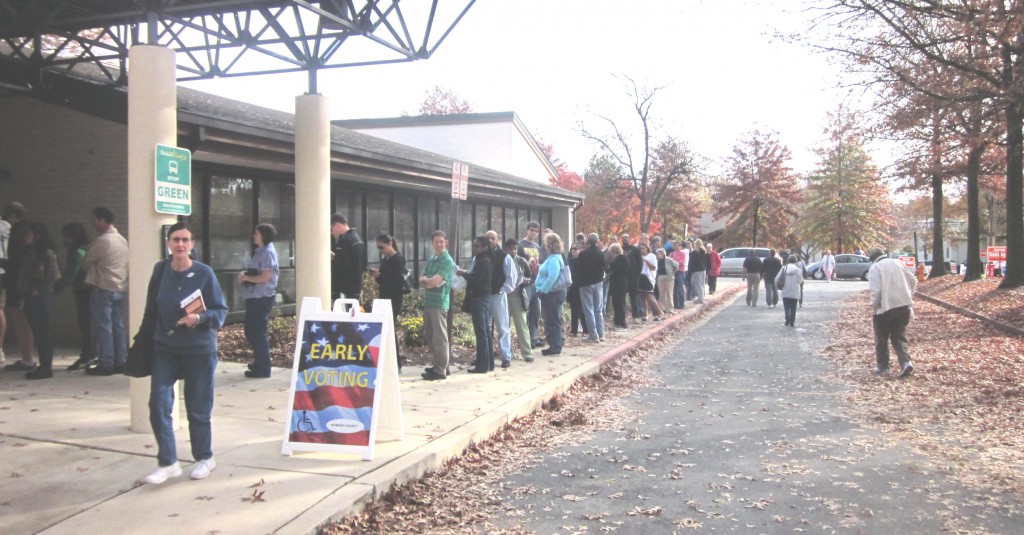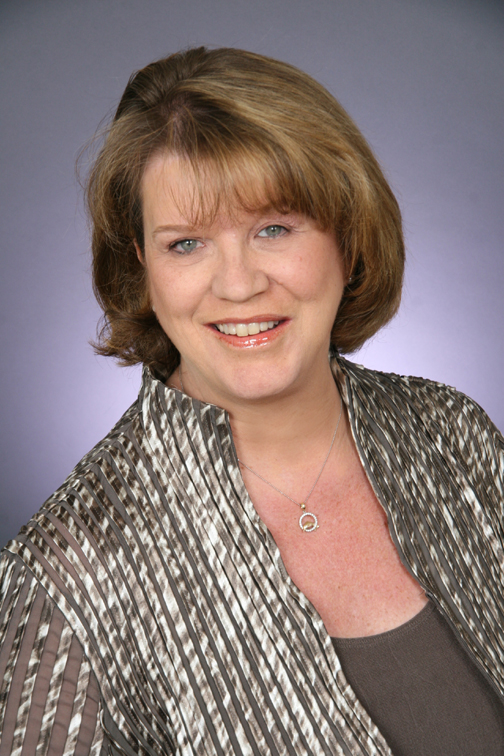Dems, watchdog group saw little evidence of voter suppression or fraud
By Glynis Kazanjian
[email protected]
After some pre-election hype, the Maryland Democratic Party and Election Integrity Maryland (EIM) agreed, Election Day concerns over voter suppression efforts and voter fraud occurrences really didn’t materialize to the extent either side expected.
Instead, the groups have vowed to stay heavily involved with the voting process. The Democratic Party is looking to expand early voting for the 2014 elections. The watchdog group plans to scrub state voting records, initially focusing on absentee ballot voters.
“We didn’t see any grave concerns,” said Maryland Democratic Party spokesman Matthew Verghese. “If there were issues, they were small and easily tackled. It’s not surprising that we and Election Integrity Maryland kind of agree on that point.”
“The problems that we noticed were pretty consistent throughout the state and they do tend to look like very small problems, but when you consider that they were replicated time and time again, it creates a bigger concern,” said Cathy Kelleher, president of Election Integrity Maryland, – an offshoot of Texas-based True the Vote.
Democrats propose extending early voting
“Our concerns at the polls were the long lines and long wait times,” Verghese said. “Those are the issues that we really want to tackle in the coming months to make sure that we’re in better shape for 2014. You’re already seeing quite a few Democrats who are talking about how we can responsibly increase the number of early voting dates or locations.”
Del. Sandy Rosenberg, D-Baltimore City, submitted a bill drafting request on Oct. 28 which would give the state election board the authority to increase the number of early voting centers in a jurisdiction for certain elections and extend early voting until the Sunday before election day. Under current law, that would give the electorate three additional voting days.
Rosenberg said he was told if the state legislature doesn’t pass a law in the 2013 legislative session, the state board will have full authority to determine future early voting dates and hours under current law. “That’s something the legislature should decide, not the board,” Rosenberg said.
Voter watchdog group will examine votes cast
Kelleher said her group will soon have a state voting database for the past five election cycles which will be purchased from the state election board.
One of the more serious problems noted on election day, Kelleher said, included several reports from voters who tried to cast votes for the Romney-Ryan ticket, and other Republican candidates, that didn’t take and appeared to default to the Democratic slate for those races.
For some it took several attempts before the Republican vote was accepted, an issue some election officials say is probably due to an individual voting machine’s calibration problems.
“It happens every election,” said State Election Director Donna Duncan. “There are potentially some machines that have a slight calibration issue. If it is noticed repeatedly or mentioned to the election judge, the election judge has the authority to take that machine out of circulation. It’s even possible a cuff of a coat potentially would hit something. But the summary screen does exactly what it is supposed to do. It shows the summary of your vote and allows you to go back as many times as necessary to re-vote.”
Scrutinizing absentee voting data
Kelleher said she will also buy voting data history specific to absentee ballot voting.
“As soon as the election is certified, I am purchasing the data for who requested absentee ballots in the state of Maryland for the last two elections,” Kelleher said. “We’re going to research who requested them and where they were mailed to.”
In Maryland, voters can request to have an absentee ballot mailed to their home address, which would match the address on their voter registration form, or they can request the ballot be mailed to a secondary address.
According to county election officials, secondary addresses are entered into a county election board database after voter registration is confirmed. But there are no protections in place to scrutinize the legitimacy of the absentee ballot request or the secondary address it is being mailed to, including when multiple ballots are requested to be mailed to the same address.
CORRECTION: Baltimore County Election Director Katie Brown said signatures are not matched from the original absentee ballot application to the voted ballot, and it is common to receive multiple ballot requests for college campuses and nursing homes.
Potentially dead voters
Kelleher’s group found dozens of potentially deceased voters from the same nursing home in Montgomery County who were still on the state’s active voter registration rolls.
“If a voter is active in the system and an application comes in, then the system will allow for that ballot to be issued,” said Wicomico County Election Director Anthony Gutierrez.
EIM also identified over 150 names registered with the U.S. Naval Academy, some whose attendance dated back to the 1970s. Kelleher said she spoke with alumni officials at the Naval Academy and was told that “nobody remains at the academy more than six years.”
Local boards attempt to verify EIM challenges
The state Democratic Party has criticized EIM’s research methods and motives and Rep. Elijah Cummings, the ranking Democrat on the House Government and Oversight Committee, launched an investigation of True the Vote and indirectly its subsidiary EIM. But county elections officials in Maryland have sent out hundreds of verification letters based on EIM’s findings.
Two submissions generated by EIM in late August and early fall that showed dead people voting and registering to vote after their deaths may have been forwarded to the state prosecutor’s office for investigation.
The State Prosecutor’s Office would not confirm or deny an investigation, and a spokesperson from the state board responded “no comment” about names possibly being investigated.
EIM made 11,000 submissions this year to state and local election board officials.
“Up until now, we’ve tried to be helpful and polite,” Kelleher said. “They’ve taken our information and have not been forthcoming with any information that would be helpful to us or to the state of Maryland publicly for [what] we’ve uncovered. There should be some acknowledgment of the work we’ve done and the attention we’ve brought to the subject of voter roll maintenance and the responsibility of the citizens to notify the board of elections when they move.”

MarylandReporter.com is a daily news website produced by journalists committed to making state government as open, transparent, accountable and responsive as possible – in deed, not just in promise. We believe the people who pay for this government are entitled to have their money spent in an efficient and effective way, and that they are entitled to keep as much of their hard-earned dollars as they possibly can.


